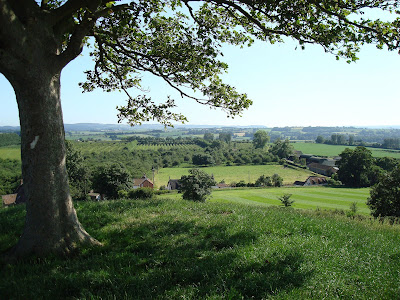 Hard as it is to believe, sitting here in this muggy apartment in midtown Manhattan, just seven days ago we were in the gorgeous English countryside. As a child, I devoured British children's literature -- Enid Blyton, especially. Walking through the narrow village lanes and across farmer's fields in Somerset I felt like I was right in the middle of one of her stories.
Hard as it is to believe, sitting here in this muggy apartment in midtown Manhattan, just seven days ago we were in the gorgeous English countryside. As a child, I devoured British children's literature -- Enid Blyton, especially. Walking through the narrow village lanes and across farmer's fields in Somerset I felt like I was right in the middle of one of her stories.Somerset is one of Britain's main farming regions and in the short time we were there, we ate incredibly well: broad beans fresh from the garden, local beets, smoked eels from a local smokery. It's hard to put one item above the rest, but if I had to choose one it would be a wedge of Montgomery's Cheddar (I'm so predictable, aren't I?)
 The Montgomery family has been making cheese in South Somerset for three generations on land that has been farmed for hundreds of years. Their cheddar is a farmstead cheese, meaning it is made from milk from their own herd of cows. They make cheese seven days a week, producing only about a dozen wheels a day.
The Montgomery family has been making cheese in South Somerset for three generations on land that has been farmed for hundreds of years. Their cheddar is a farmstead cheese, meaning it is made from milk from their own herd of cows. They make cheese seven days a week, producing only about a dozen wheels a day."We're one of the few cheesemakers who still uses calf rennet, the traditional source of the enzyme, to start the curd," Jamie Montgomery says, "and possibly the only farmhouse Cheddar still using an old, slow peg mill to produce the peculiar fissuring and brittleness of the cheese."
Those thin fissures encourage blue veining after the cheese has been cut, adding to the cheese's flavour. The cheese is aged for a least a year and is at its best when not overly sharp or acidic. Find it at Artisanal or Murray's or ask for it at your local cheese shop.



No comments:
Post a Comment